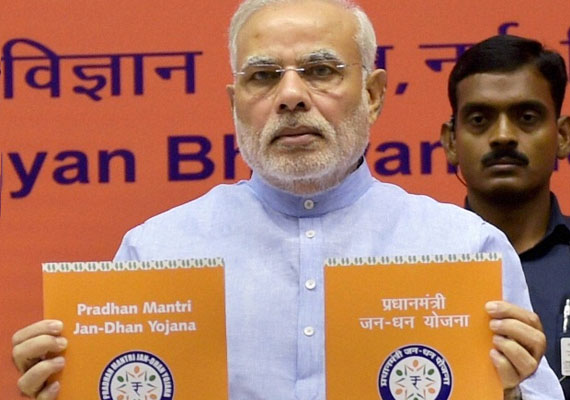How Modi's Jan Dhan Yojana will benefit poorest of the poor

The Narendra Modi-led NDA government has rolled out its ambitious financial inclusion programme, the Pradhan Mantri Jan Dhan Yojana (PMJDY), and said banks have opened a record 1.5 crore accounts on Thursday through thousands of camps, exceeding the firstday target of 1 crore accounts. The scheme aims to take banking facilities to 7.5 crore households by January 26, 2015, against the earlier deadline of August 15, 2015.
Under the scheme, each customer will get a RuPay debit card, with an in-built accident insurance cover of Rs 1 lakh and an overdraft facility of Rs 5,000, subject to satisfactory operations of the account for at least six months. To help lenders meet the target, the prime minister has also announced a life cover of Rs 30,000 for all those opening bank accounts by January 26. While the life cover will be free, for the debit card, a fee of 50 paise will be charged per transaction.
The Prime Minister believes the entire exercise will strengthen the country’s banking system as it will rope in an additional 50,000 business correspondents and set up about 7,000 branches and 20,000 new automated teller machines, in the first phase.
Here we take a look at how the scheme will benefit the lower strata of the society:
Providing banking facility without any extra cost
The Jan Dhan Yojana provides for a free zero-balance bank account with a debit card. While launching the scheme, Modi said, the scheme would mark the beginning of the end of "financial untouchability" and rid the country of poverty. He said after 68 years of Independence, not even 68 per cent of the population is covered by the banking system.
Now the poor can swipe the card too
Under the programme, account holders will be given a RuPay debit card for PoS sales. And upon satisfactory operation of the account for six months, the account holder will get a Rs 5000 overdraft facility. Modi said having a debit card will help counter the current economic apartheid in the country, and will strengthen the savings habit in the country.
Rs 1 lakh accidental insurance
All households that open such bank accounts under the Jan Dhan Yojana will get Rs 1 lakh accident insurance. Given the considerably high expenses when it comes to medical emergencies, the lack of formal credit facility through banking channels pushes the poor deep into the debt-traps.
LIC, the country's largest financial institution, will offer a life cover of Rs 30,000 while HDFC Ergo will provide a Rs 1-lakh personal accident cover to RuPay cardholders. As per the agreement between HDFC Ergo and NPCI, a claim will be disposed only if the card is active. A card will be considered active if the cardholder has swiped it within 45 days of making a claim.
"I believe when a person opens a bank account, he or she takes the first step to get connected with the economic system. Today, the 1.5 crore families which got connected with the economic system will give a boost to the economy," the prime minister said. Modi noted that it was easy for the rich to get loans at low interest rates but that the poor are forced to borrow from moneylenders at five times that figure.
To cover a vast majority of country’s poor
The Jan Dhan Yojana aims to cover 60 per cent of the country's population that does not have access to formal banking services.
Account holders to get Centre/states benefits
Under the Jan Dhan Yojana, all benefits from the Centre/states/local bodies are proposed to be transferred to the accounts of beneficiaries. The government is also likely to push the Direct Benefits Transfer (DBT) scheme and try to restart it for liquefied petroleum gas. It is likely the National Rural Employment Guarantee Scheme will be included under DBT.
Financial literacy
According to the government the programme will impart financial literacy up to village level. The government is also said to set over 60,000 enrolment camps in rural areas to make people aware of the importance of bank accounts.
No comments:
Post a Comment